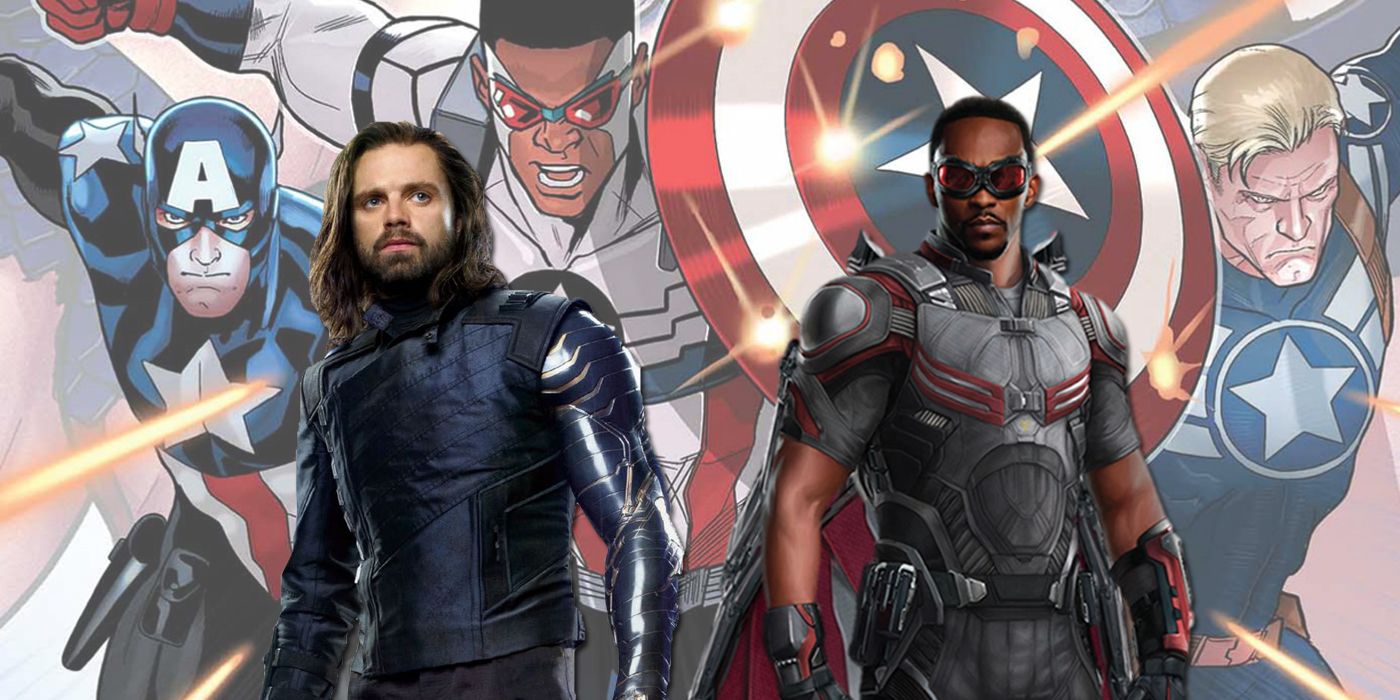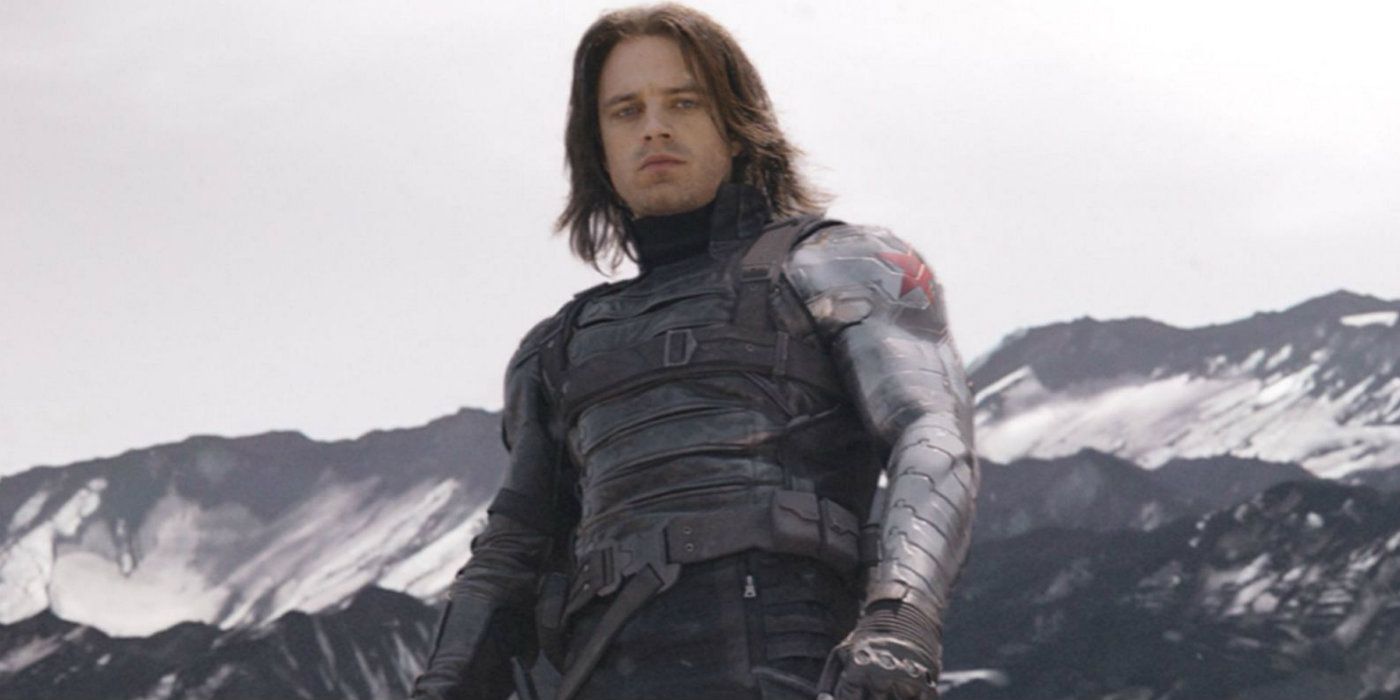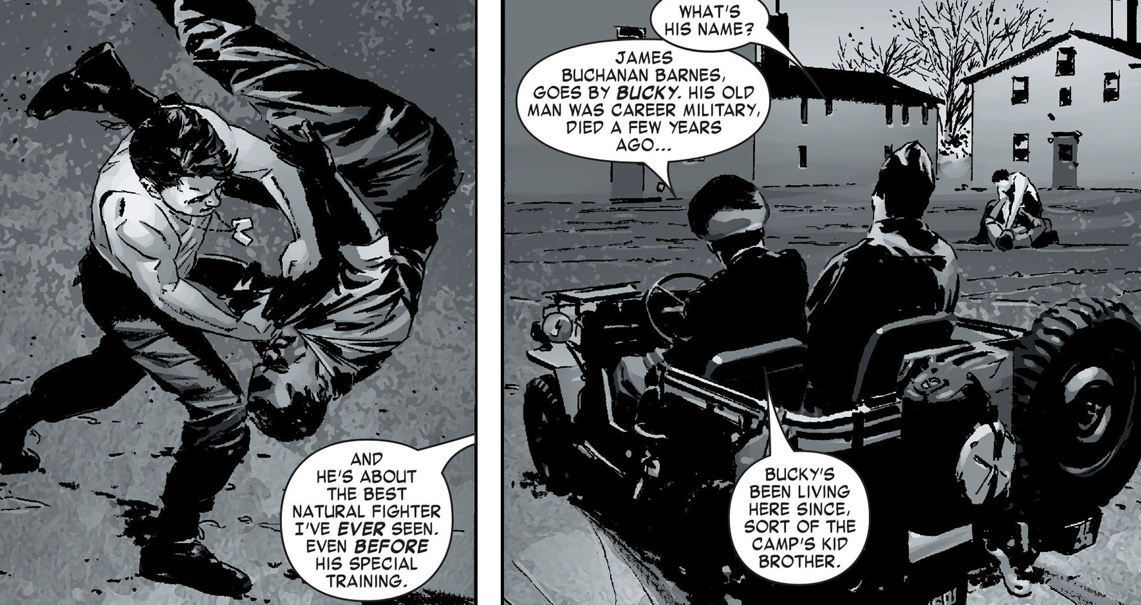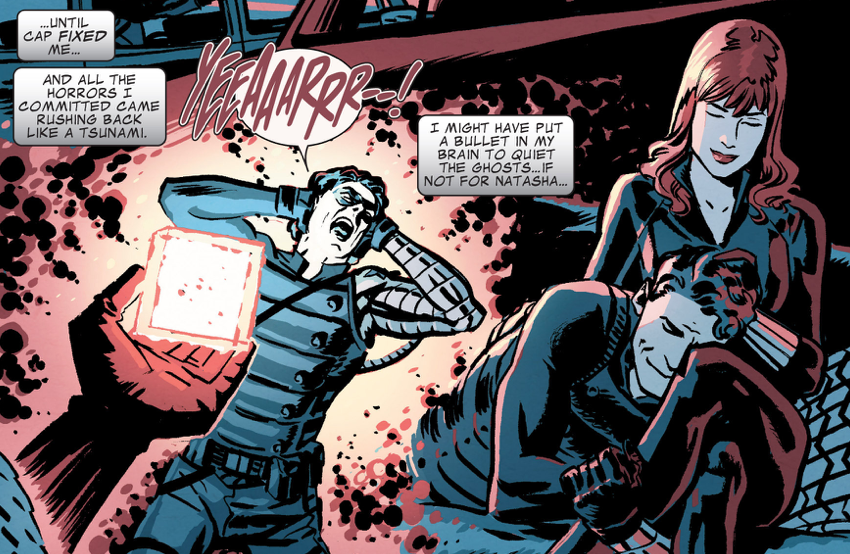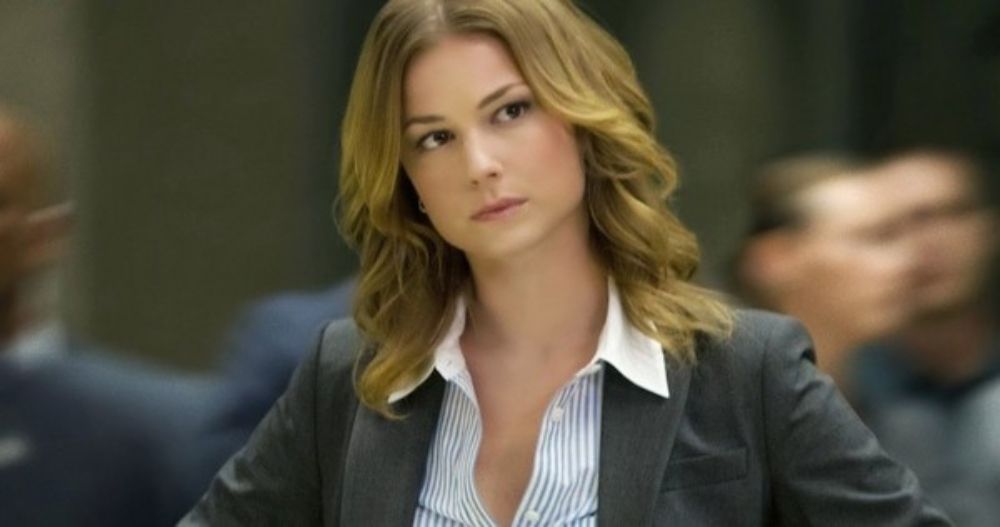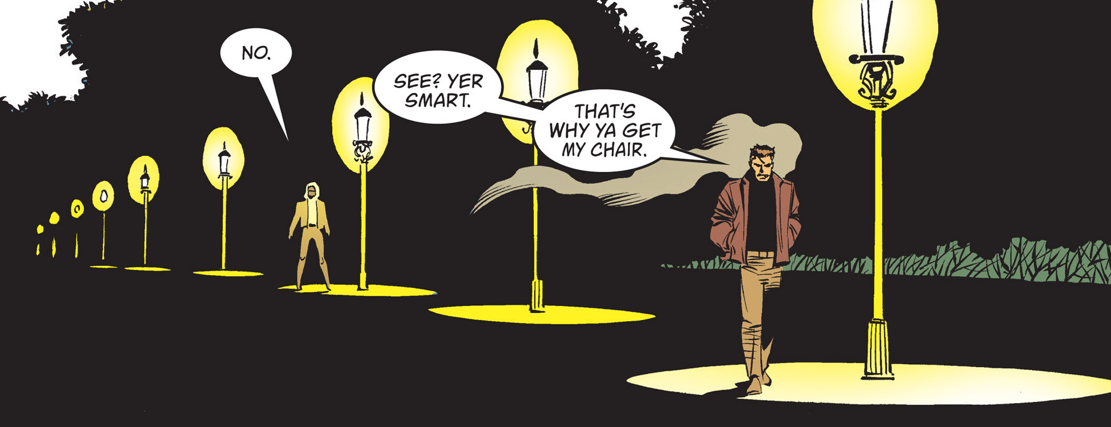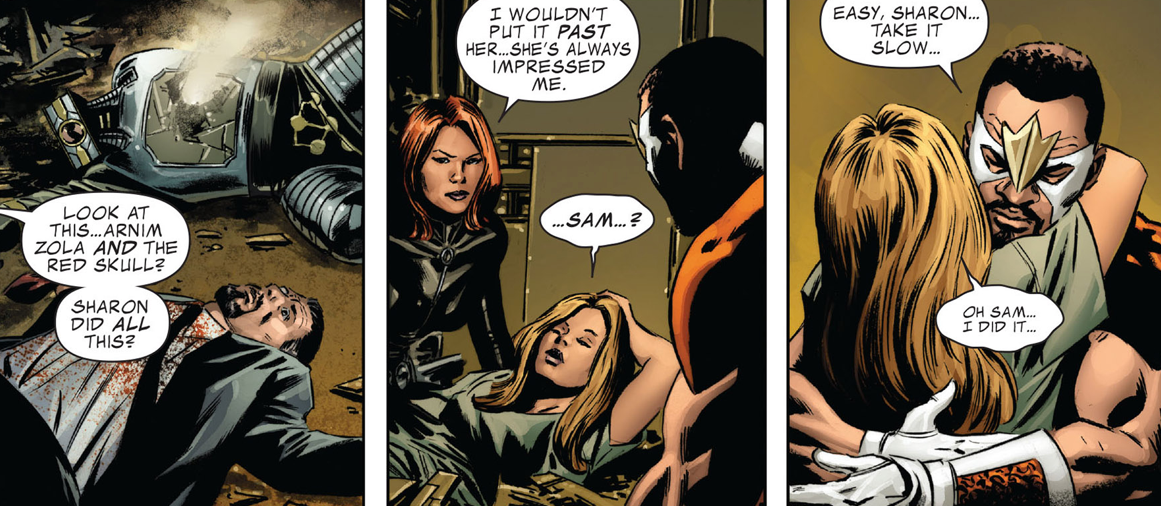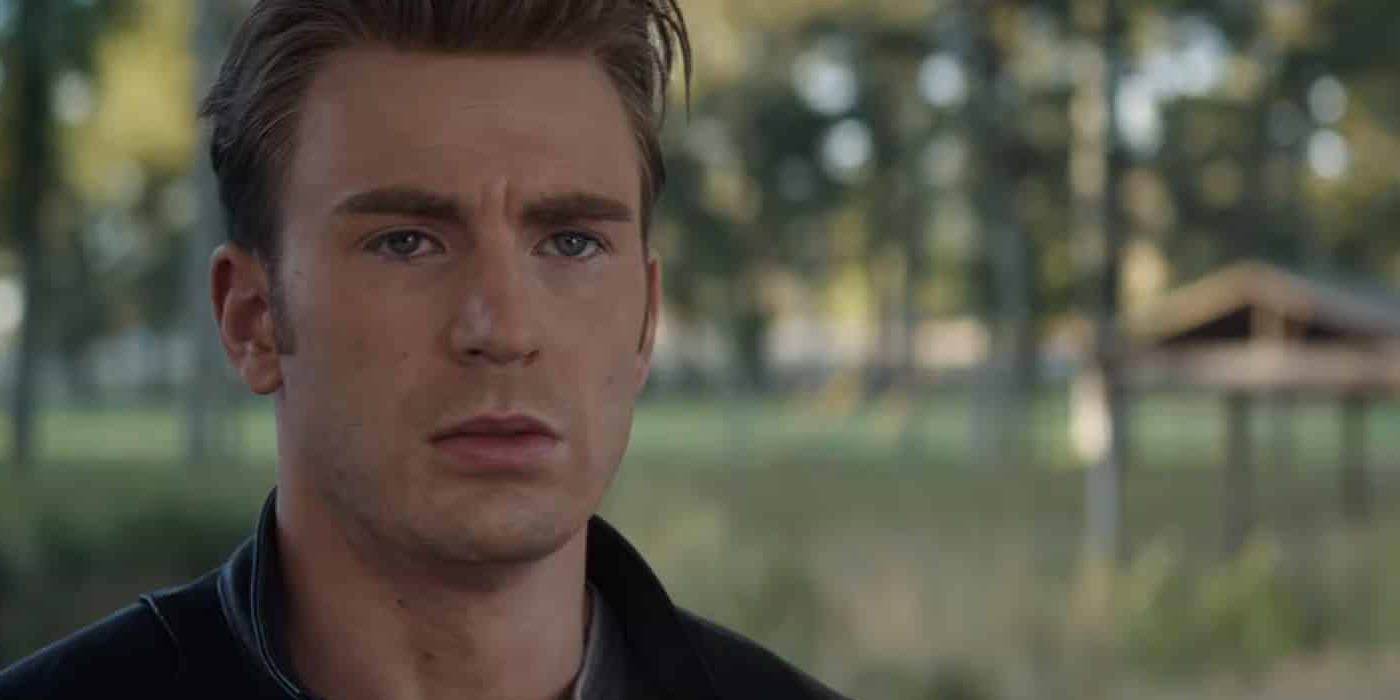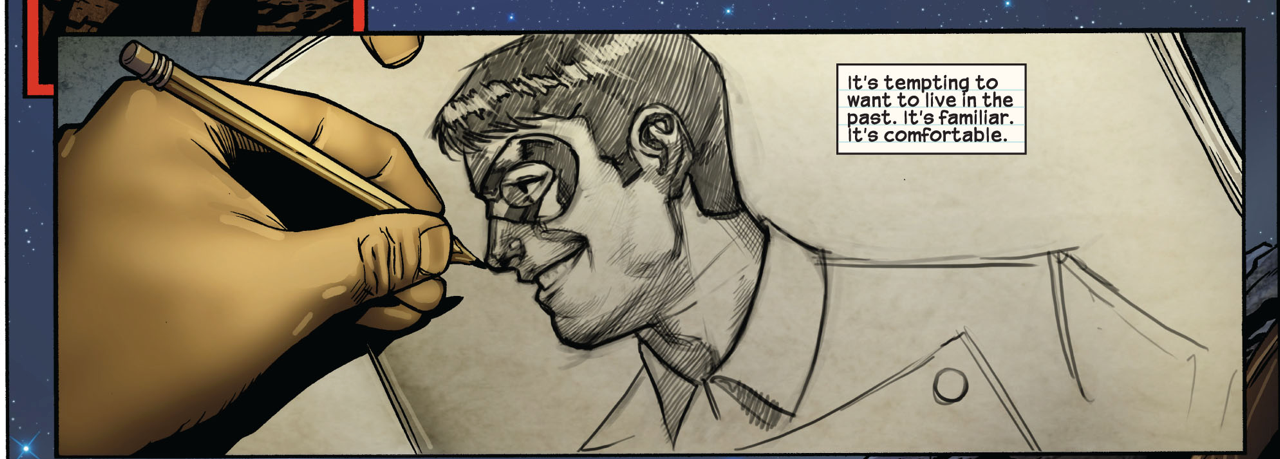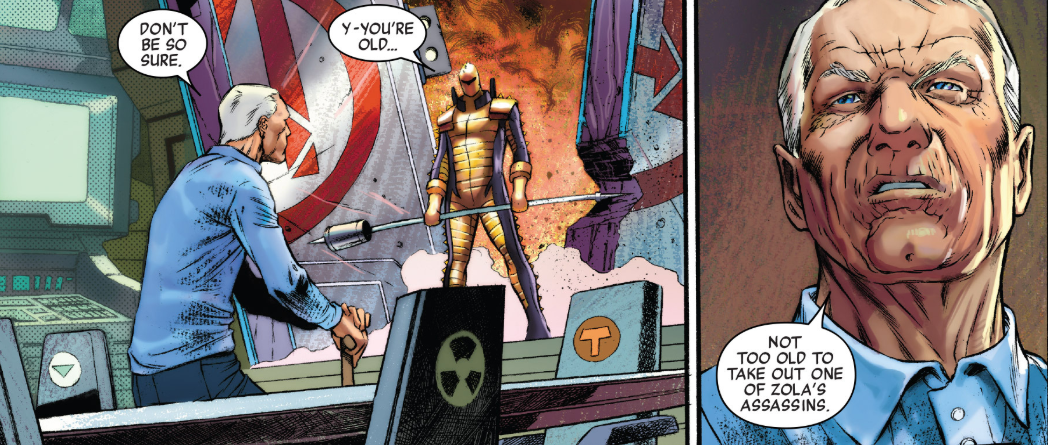While the Captain America films are undoubtably some of the best movies in the MCU's arsenal, they tend to fall short on being true adaptations of Cap's mythos. When one thinks about a Captain America story, the key players are Sam Wilson, Bucky Barnes, Sharon Carter and Steve Rogers himself. However, with the exception of Sam Wilson, the MCU's depiction of these characters sometimes miss the mark. Here's how.
BUCKY BARNES
In the movies, Bucky Barnes and Steve Rogers were best friends from childhood. While Bucky grew up to be the physically stronger of the two, Steve was the scrawny kid trying to get into the military. Bucky is depicted as the responsible one, often trying to reign Rogers in when he gets too far in over his head. He's also got a very dry sense of humor and a slick, coolness to him.
However, in the comics, Bucky was his kid sidekick, not his childhood best friend. Sure, the two men grew to consider each other as great friends, but they didn't meet until Steve was already Captain America and Bucky was picked to be his sidekick.
Contrary to the movies, it's Steve who acts like the older brother to Bucky, often bailing him out of fights and other sticky situations. Bucky isn't a cool, suave guy, he's a scrappy 16-year-old kid with a penchant for getting into trouble. He mouths off to authority, plays pranks and marches to the beat of his own drum. He's incredibly impulsive but driven by his sense of right and wrong. He's not quippy in the sense that Tony Stark is, but he speaks his mind and isn't afraid to stand up to people.
The entire nature of their relationship changes when Steve isn't his mentor. In the comics, Bucky was meant to be seen as the antithesis of Hitler Youth, the bright-eyed American kid who stood up for what was right. In the meantime, Bucky was also able to use his position to perform proto-black ops missions that Captain America himself couldn't be seen doing.
Of course, it's wholly reasonable that Barnes was portrayed as older for the MCU's universe, arguably it's preferable. But there's no solid explanation for what makes Bucky such a good candidate for the Winter Soldier program if he doesn't have the skillset or training to back it up. Barnes' experience as a fighter and a stealth operative was the kind of training that made him so valuable to the Russians when they started the Winter Soldier program. In the movie universe, he's more or less just another soldier, never shown to be quite so extraordinary until his days as the Winter Soldier.
Speaking of the Winter Soldier, the MCU's depiction of this period in Bucky's life is also vastly different from the comics. In Captain America: The Winter Soldier, Barnes doesn't really defy orders. He gets his mission, completes it and, even if he questions his bosses, there's a meeker nature to his responses.
In the comics, Bucky had no memory because of the blast he faced when Zemo's drone plane exploded and killed him. However, he still had the muscle memory from his training and his anti-authority personality. He mouthed off to his handlers on more than one occasion, even though he did carry out their tasks in the end. His verbal backfiring with his handlers was proof that Bucky was still in there, fighting their control to regain his sense of self. It also creates an interesting dynamic for the Winter Soldier: the Russians could never really control him the way they wanted to, that's why they had to keep putting him on ice.
Even after regaining his memories via the Cosmic Cube, Bucky retained his witty, hot-headed nature. Redemption is such a strong element in Bucky's comic storyline, but in the MCU he's more or less a quiet, reserved man who wants to be left alone.
One such way he defied orders was by entering a relationship with the Black Widow, the Red Room's other top operative. Bucky has recounted that Natasha kept him alive, giving him something to look forward to both during his days under the Russians' control and after. It provided a way to humanize the character and showcase his propensity for love even while mind-controlled.
In the MCU, this whole relationship is nixed, taking away that pivotal emotional anchor for Bucky. After all, Bucky can't have a romantic past in the Red Room with the Black Widow if he's with Hydra and not the Russians. Additionally, MCU Bucky is rather devoid of personality, a stark contrast to the hot-headed, quick-witted and impulsive Bucky of the comics.
SHARON CARTER
When it comes to the comics there can be no question about it: Sharon Carter is the love of Steve Rogers' life -- he's said as much on multiple occasions, after all. Throughout various volumes of Captain America, when Steve thinks of his future, it's Sharon who he imagines spending the rest of his life with and it's Sharon who he fought tooth and nail to be with. In the MCU, however, she's relegated to a glorified cameo as bits of her story and personality were given to Peggy Carter and Natasha Romanoff.
In the original comics, Peggy was more or less a footnote in Cap's mythos, significantly more important to Sharon's story than Steve's. Her entire "take no prisoners" attitude, relationship with S.H.I.E.L.D. agents like Dugan and her position as director were all lifted from Sharon's 616 narratives. It's Sharon who was the first female Director of S.H.I.E.L.D. in the comics, not Peggy.
In The Winter Soldier, she is supposed to be the one tracking down Bucky with Steve, traveling the country and dodging S.H.I.E.L.D.'s interference. However, that position was given to Natasha. Additionally, MCU Natasha's entire relationship with Fury feels more like 616 Sharon and Nick than anything. Her reaction to not being told of his "passing," how she shies away from emotional connection -- it's all very fitting for Sharon.
As Mark Waid once said, Sharon is a cynic and Steve is an optimist, which is why they play off each other so well. In The Winter Soldier, it's Natasha who takes the role as the cynic to play against Steve's optimism. This characterization swap is partially because Sharon was originally planned to be the female lead of the movie before being replaced by Natasha. By the time Infinity War rolled around, Sharon's planned role was entirely scrapped. Due to the fact that she is a founding member of the Secret Avengers in the comics (and was allegedly still dating Steve Rogers at the time in the movies), it would have made perfect sense for her to be on Steve's underground team for Infinity War.
Sharon's roles in both The Winter Soldier and Captain America: Civil War were minuscule, and her prominence in Cap's mythos was vastly underplayed. At the very least, Agent 13 should have been present at the battle towards the end of Endgame, but she was nowhere to be seen. Her love story with Steve never got the same kind of respect from the comics and she was promptly dropped from the films.
In the comics, Sharon is a survivor who keeps going no matter how many times she's hit, a fighter who has impressed the likes of Natasha Romanoff, Valkyrie, and even her enemies. In the movies, she's merely a cameo.
STEVE ROGERS
The fatal flaw of MCU Steve's characterization all comes down to one movie: Avengers: Endgame. If The First Avenger chronicles how Steve became Captain America and started life in the present, it makes sense that, by the first Avengers film, he's a little awkward and adjusting. By The Winter Soldier, he's gotten used to life in the present, making lists of things he has yet to explore, and developing relationships that last (such as that with Natasha and Sam). The Winter Soldier is about Steve letting go of the past and moving on, closing that chapter in his life. Civil War is about finally burying the past (as symbolized by the literal burying of Peggy) and moving on with the present (making sure Bucky has a better future). During Civil War he stands up for what he believes is right, fighting for what he deems would make a better tomorrow.
By having Steve travel back to the past in Endgame, his character arc is completely shattered. Not only did he take Peggy's husband away from her (someone she thanked him for saving), he robs her of the life she was happy to have. It makes Steve's decision seem selfish, as he abandons his friends, most notably Bucky, who he fought valiantly to save. Peggy was happy with the life she lived, she told him as much in The Winter Soldier, so why would Steve, who is known for his sacrifices, want to take that away from her? It simply doesn't add up when posed against the previous films' characterization.
Mark Waid's 2012 series Man Out of Time is the best example of why that approach doesn't work for Steve Rogers. In this miniseries, after Steve is thawed from the ice, he only has one thing on his mind: saving Bucky. For him, he just watched his partner die, and he is determined to get back to the past to prevent it, consulting Reed Richards and Tony Stark about time travel possibilities. While he's stuck in the present, Rogers also experiences the present. Tony tells him all about space travel, he learned about Civil Rights and the advances in Women's Rights. All the while, Steve joined the Avengers and became friends with this new group of people. He became less worried about getting back the life he lost, and more content with the life he has.
When Kang the Conquerer sends him back to the past, Steve realizes that the life he had wasn't all it was cracked up to be. He's dejected by segregation's place in his history, for example. He fights to return to the present and when he does, he stays. He notes that the world still needs Captain America, to make tomorrow's future even better. Steve also proclaims that the Avengers had become his friends and he didn't feel right leaving them behind. In Endgame, Steve would have known the Avengers longer than 616 Steve at the point of Man Out of Time, which makes his decision to leave them behind all the more puzzling.
Even though he keeps the legacy of Captain America alive by giving the shield to Sam, it's not in Steve's character to just give up. In the 616, even when Sam is Cap and Steve is elderly, he never stops fighting. He holds a position of power in the Avengers and with S.H.I.E.L.D., fighting villains who threaten American values like freedom.
The Captain America movies are easily still among the best the MCU has to offer, but as Captain America movies, they do fall short on occasion. Part of this is because Civil War was more so an Avengers movie than a Cap movie, giving those characters less time to shine on their own.
Diverging from the comics isn't inherently bad. As with any adaptation, differences are a good thing. But sometimes, those changes aren't always the best. Yes, the Captain America movies are great, but they do have their moments for improvement. With The Falcon and The Winter Soldier coming to Disney+ soon, maybe the Cap characters will finally have their time in the sun (albeit, without Steve Rogers there).

